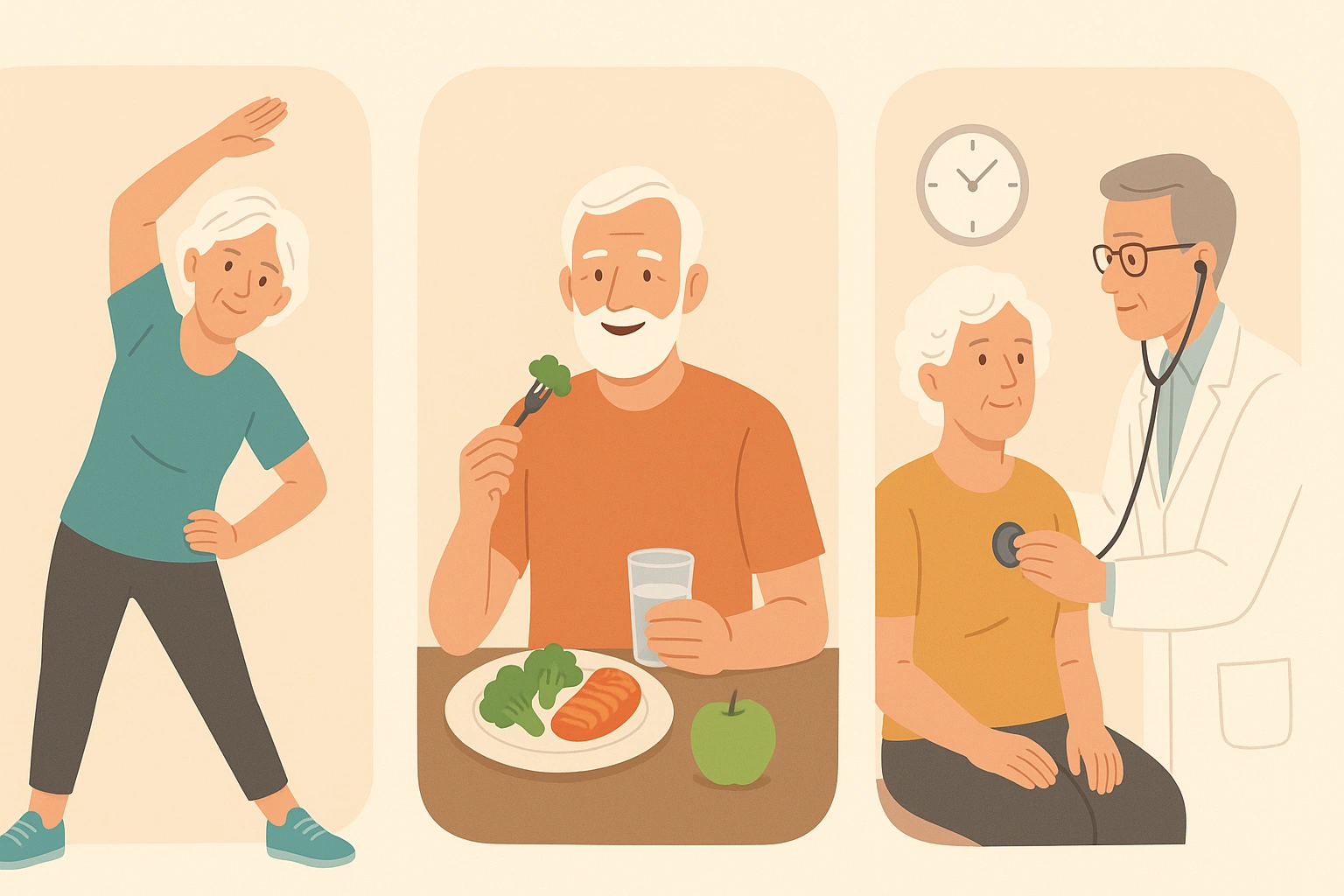
We often hear that aging is inevitably linked with declining health, but senior health prevention shows us another side of the story. While some changes with age are natural, senior health prevention strategies prove that many serious conditions can actually be delayed or avoided. Experts emphasize that senior health prevention is the key to reducing risks of chronic illness, with studies showing that up to 80% of premature heart disease and stroke cases can be prevented through simple lifestyle adjustments. By making these choices early, senior health prevention becomes less of a challenge and more of a daily habit that protects long-term vitality.
This guide is your roadmap to taking control of your health journey, offering practical senior health prevention strategies that make a real difference. By following evidence-based senior health prevention tips, you can shift from a reactive approach to a proactive mindset that safeguards long-term well-being. Each step in senior health prevention helps you reduce risks of common conditions while building habits that support vitality and independence. After reading, you’ll not only understand senior health prevention more clearly but also gain the tools to cultivate a healthier and more fulfilling future.
What is Proactive Health Prevention?
Proactive health prevention is all about making intentional choices that keep problems from developing, and this is exactly what senior health prevention emphasizes for long-term well-being. Instead of waiting until illness strikes, senior health prevention encourages early action like screenings, balanced nutrition, and active living. Just as regular oil changes keep a car engine smooth, senior health prevention ensures the body functions optimally as we age. By prioritizing senior health prevention, you’re not only reducing risks but also building a foundation for vitality and independence.
For seniors in 2025, this concept is more critical than ever. The focus in modern geriatrics has shifted dramatically from merely treating illness to actively promoting wellness and extending “healthspan”—the years of life lived in good health. As research from institutions like the National Institute on Aging consistently shows, lifestyle interventions are incredibly powerful tools for elderly disease prevention, often rivaling the effectiveness of medications for certain conditions.
Why a Focus on Prevention is Crucial for Seniors
Adopting a preventative mindset is one of the most empowering choices an older adult can make. It’s an investment in your autonomy, your happiness, and your future. Here are the life-changing benefits of prioritizing health prevention.
Maintaining Physical Autonomy and Independence
Preventing conditions like osteoporosis, heart disease, and severe arthritis means you’re more likely to maintain the strength and mobility needed for daily life. This translates to living independently, driving, shopping, and participating in hobbies without limitation for much longer.
Preserving Cognitive Health and Sharpness
Many of the same strategies that protect your heart also protect your brain. Preventing or managing conditions like high blood pressure and diabetes is crucial for reducing the risk of vascular dementia and supporting overall cognitive function. A healthy body is the foundation for a sharp mind.
Enhancing Overall Quality of Life
Prevention is about more than just avoiding illness; it’s about promoting wellness. When you feel strong, energetic, and healthy, you have the capacity to engage fully in life—spending quality time with loved ones, traveling, and pursuing passions. It’s the key to making your golden years truly golden.
Reducing Healthcare Costs and Burdens
Preventing a chronic disease is far less expensive and emotionally taxing than treating one. By investing in preventative measures, you can avoid costly medications, frequent doctor visits, and hospital stays, ensuring both your physical and financial well-being. A healthy lifestyle, as detailed on sites like peternakan.web.id, is an investment that pays for itself.
The 5 Pillars of Senior Health Prevention

1. Regular Health Screenings and Check-ups
This is your early warning system. Many serious conditions are silent in their early stages. Regular check-ups allow your doctor to monitor key health markers and catch potential issues before they become major problems. Don’t skip your annual physical!
2. A Balanced, Nutrient-Dense Diet
Food is medicine. A diet rich in fruits, vegetables, lean protein, and whole grains can prevent heart disease, type 2 diabetes, and certain cancers. It also provides the nutrients needed for strong bones and a healthy immune system. Focus on limiting processed foods, sugar, and unhealthy fats.
3. Consistent Physical Activity
Movement is a cornerstone of prevention. Regular exercise helps maintain a healthy weight, strengthens your heart and bones, improves balance to prevent falls, and even boosts your mood and cognitive function. Aim for a mix of cardio, strength, balance, and flexibility exercises.
4. Staying Up-to-Date on Vaccinations
As we age, our immune systems can become less effective. Vaccinations for influenza, pneumonia, and shingles are simple yet incredibly effective tools for preventing serious, and sometimes life-threatening, illnesses.
5. Nurturing Mental and Social Well-being
Health isn’t just physical. Chronic stress and social isolation can have tangible negative effects on your body, including increased inflammation and blood pressure. Stay connected with loved ones, engage in hobbies, and practice stress management techniques like mindfulness or meditation.
Prevention in Action: A Real-Life Scenario
Meet Robert, a 75-year-old who decided to take his health into his own hands. Five years ago, his doctor noted his blood pressure was creeping up and his balance wasn’t what it used to be. Instead of waiting for a problem, Robert started a daily 30-minute walk, joined a Tai Chi class for balance, and made a point to reduce the salt in his diet. Today, his blood pressure is in the healthy range, he feels more confident on his feet, and he has more energy than he did at 70. Robert’s story is a perfect example of how small, consistent senior health prevention tips create a massive positive impact over time.
Key Preventative Health Screenings for Seniors
Understanding which screenings are important is a key part of elderly disease prevention. Here’s a look at some of the most common ones.
| Screening | What It Checks | Why It’s Important | General Frequency |
|---|---|---|---|
| Blood Pressure | The force of blood against artery walls | Detects hypertension, a major risk for heart attack & stroke | At least annually |
| Cholesterol Panel | Levels of “good” and “bad” cholesterol | High cholesterol can lead to clogged arteries | Every 1-5 years, based on risk |
| Bone Density Scan | Measures bone strength and mineral content | Screens for osteoporosis to prevent fractures | Typically starts around age 65 |
| Colonoscopy | Examines the colon for polyps or cancer | Can prevent colon cancer by removing polyps early | Every 10 years for average risk (age 45-75) |
Common Prevention Mistakes to Avoid
A proactive approach requires awareness of common missteps. Avoid these to stay on the right track.
- Ignoring “Minor” Symptoms: Persistent fatigue, shortness of breath, or unexplained weight loss should never be dismissed as “just getting older.” These can be early signs of underlying issues. Report any new or changing symptoms to your doctor.
- Skipping Recommended Vaccinations: Believing that you “don’t need” a flu shot or other vaccines is a dangerous gamble. These are proven, safe ways to prevent severe illness.
- Being a “Passive Patient”: Don’t be afraid to ask your doctor questions. Prepare for your appointments, be honest about your habits, and be an active partner in your healthcare decisions.
- Neglecting Dental and Vision Health: These are not separate from your overall health. Poor oral health is linked to heart disease, and vision problems can lead to falls. Keep up with your regular dental and eye exams.
- Thinking “It’s Too Late to Quit”: Whether it’s smoking or a sedentary lifestyle, it is never too late to make a positive change. The health benefits of quitting smoking, for example, begin almost immediately.
Expert Tips & Best Practices
Here are some practical, expert-backed tips to integrate prevention into your daily life.

- Know Your Numbers: Be aware of your key health metrics: blood pressure, cholesterol levels, and blood sugar. Knowing your baseline is the first step to managing your health.
- Prioritize Sleep: Aim for 7-8 hours of quality sleep. Poor sleep can impact everything from your immune system to your blood pressure. Create a relaxing bedtime routine.
- Stay Hydrated: Dehydration can cause confusion, constipation, and even falls. Sip water throughout the day, even if you don’t feel thirsty.
- Cultivate a Positive Outlook: “A positive mindset is a powerful health tool,” notes geriatric specialist Dr. Susan Cole. “Studies show that optimism and a sense of purpose are linked to better health outcomes and longevity.”
- Schedule Your Screenings: Don’t wait for a reminder. At the beginning of each year, schedule your annual physical and any other recommended screenings. Treat them as non-negotiable appointments.
Frequently Asked Questions (FAQ)
Q: What is the single most important preventative action a senior can take?
A: While a holistic approach is best, regular physical activity is arguably the most impactful preventative measure. It benefits heart health, bone density, muscle mass, cognitive function, and mood, directly combating many of the most common age-related health issues.
Q: Is it too late to start preventative health habits in my 70s or 80s?
A: Absolutely not. The body has a remarkable capacity for improvement at any age. Starting healthy habits like a balanced diet, gentle exercise, and regular screenings can significantly improve your quality of life and reduce health risks, no matter when you begin.
Q: How does mental health fit into disease prevention?
A: Mental health is fundamentally linked to physical health. Chronic stress and loneliness can increase inflammation and weaken the immune system, raising the risk for heart disease and other conditions. Managing stress and staying socially connected are crucial elderly disease prevention strategies.
Q: Are annual physicals really necessary if I feel fine?
A: Yes. Many serious conditions, such as high blood pressure, high cholesterol, and early-stage cancers, often have no noticeable symptoms. An annual physical and recommended screenings are essential for early detection, which is key to successful treatment and prevention.
Q: What are the most important vaccinations for older adults?
A: Key vaccinations for seniors include the annual flu shot, the pneumococcal vaccine (for pneumonia), and the shingles vaccine. It’s also important to ensure you are up-to-date on your Tdap (tetanus, diphtheria, pertussis) booster. Always consult your doctor for personalized recommendations.
Conclusion
Adopting a preventative approach to your health is the most profound investment you can make in your future, and senior health prevention is the key to achieving it. By applying senior health prevention consistently—through regular screenings, timely vaccinations, and maintaining a healthy lifestyle—you’re actively shaping a stronger foundation for your well-being. Senior health prevention also empowers you to stay independent, reduce risks of chronic illness, and enjoy more energy in daily life. Most importantly, embracing senior health prevention puts the power of healthy aging directly in your hands.
For more in-depth information on prevention, visit trusted resources like the Centers for Disease Control and Prevention (CDC). Remember, the best time to start was yesterday. The next best time is right now.
What is one proactive health step you will take this month? Share your goal in the comments below!
